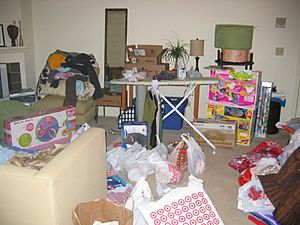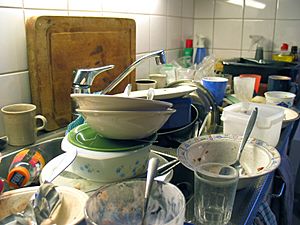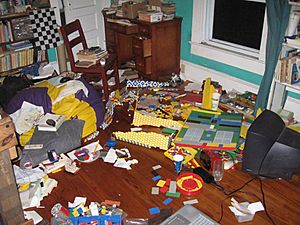Homemaker facts for kids
A homemaker is someone who takes care of their home and family. This includes doing daily chores and making the home a comfortable place to live. Both men and women can be homemakers. Sometimes, a homemaker might also work outside the home.
Contents
What is a Homemaker?
For a long time, people mostly thought of women as homemakers. A woman who spent most of her time looking after the family home was often called a "housewife". Many women still use this word today because they believe homemaking is very important.
History of Homemaking
Homemaking in Traditional Societies
For thousands of years, men were usually seen as the main "breadwinners" in families. This means it was their job to earn money or find food. Men often hunted animals or grew crops. Women usually took care of the children, prepared food, cleaned the home, and made or mended clothes.
In societies where people were hunters and gatherers, like the traditional Aboriginal people of Australia, men hunted animals for meat. Women gathered other foods like grain, fruit, and vegetables. One reason for this was that women often had babies or young children. It was easier to gather food with a baby than to hunt fast animals. This way, communities could continue for many generations. Even in simple homes, men and women had different jobs. In very cold places like the Arctic, men hunted in the snow. Women kept the home warm in ice huts (called "igloos"). They also made clothes from animal skins. Babies stayed very close to their mothers to keep warm.
In rural societies, where most people lived on farming, women also took care of gardens and animals around the house. They sometimes made drinks like ale. They also helped men with heavy farm work when it was needed quickly, especially during certain seasons.
Some heavy jobs a traditional "housewife" (homemaker) in a farming community might do were:
- Picking fruit when it was ready for market.
- Planting rice in a paddy field.
- Harvesting and stacking grain.
- Cutting hay.
Homemaking in Urban Societies
An urban society is one where most people live in towns and cities. In urban societies, since ancient times, most men worked to earn money. They worked in workshops, banks, and other businesses. They also worked in churches, schools, and town councils. It was usually seen as the woman's job to be a "housewife" (homemaker).
Not all women married. Some unmarried women stayed home and did housework for their families. Others worked outside the house, like men. In many urban societies, there were only a few jobs women were allowed to do. Even today, some traditions about women's jobs still exist.
Homemaking in Modern Society
In the 1800s, more women started working jobs usually done by men. Many large factories opened, first in England, then in other European countries and the United States. Thousands of young women went to work in these factories.
Other women, like Florence Nightingale, chose to do important jobs even if they were not poor. They didn't need to work, but they wanted to help. For most families with a husband and wife, it was still thought that the husband should earn money. The wife's job was to be a "housewife" (homemaker). Women were often very proud to be good homemakers. They made sure their homes and children were clean. They pressed their husband's shirts and cooked tasty meals every night.
In the first half of the 1900s (1901-1950), there were two big wars: World War I and World War II. Many men from different countries went to fight. While the men were away, their wives went to work to keep their countries running. These women were also homemakers, but they worked in factories, businesses, and on farms.
By the 1960s in Western countries, it became more common for women to work and have a "career". However, many people still thought that once a woman got married, she should stop working and become a "housewife" (homemaker).
Today, many women have good educations and can earn a lot of money. In some families, especially if there are young children, the husband might be the homemaker. In many families where both partners work, they share the "housework" and childcare. In other families, the wife still stays home to care for the house and children, while the husband works. Also, in some families, the wife works to provide for the family, and the husband stays home to care for the home and children.
What Does a Homemaker Do?

The job of a homemaker is to care for a family and their home. Here are some common things a homemaker does:
- Planning meals for the family.
- Buying food and groceries.
- Preparing and cooking food.
- Serving meals to the family.
- Washing dishes after meals.
- Cleaning the house.
- Organizing the home.
- Decorating the home.
- Doing seasonal cleaning, like washing curtains.
- Arranging furniture and choosing colors for rooms.
- Washing clothes.
- Ironing clothes.
- Mending clothes (and sometimes making them).
- Shopping for new clothes and other family needs.
- Getting children ready for school.
- Bathing and dressing children.
- Feeding babies.
- Playing with children.
- Comforting babies, children, and partners.
- Doing first aid for minor injuries.
- Caring for sick family members.
- Caring for pets.
- Entertaining guests.
- Planning for guests, holidays, and celebrations.
- Remembering everyone's birthday.
- Driving children to school, sports, and other activities.
- Helping with homework.
- Supervising music practice.
- Reading storybooks to children.
- Putting children to bed.
- Cleaning out the garage.
- Maintaining and watering household plants.
- Preparing a family budget.
- Researching ways to use the family's money wisely.
- Paying bills.
Related pages
Images for kids
-
A 1950s washing machine.
See also
 In Spanish: Tareas domésticas para niños
In Spanish: Tareas domésticas para niños
 | Selma Burke |
 | Pauline Powell Burns |
 | Frederick J. Brown |
 | Robert Blackburn |








